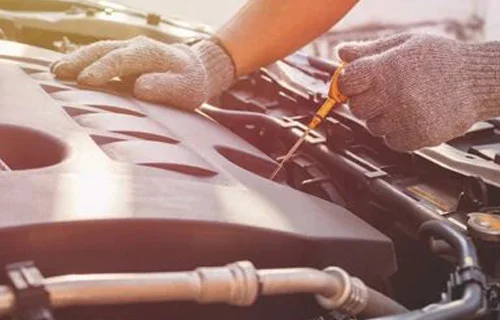Your engine is the heart of your vehicle; if it’s not working properly, you can be sure that you won’t be going anywhere anytime soon. Proper engine maintenance also ensures that your engine doesn’t overheat on the road or shut down at an intersection. A misfiring engine is a major safety concern when it comes to your vehicle and the safety of the people inside.
Although the engine looks like one giant automotive part, it is made up of many different components that work together to create and distribute power in your vehicle. At Glenn’s Auto Repair, we recommend regular engine maintenance to prevent future problems and future drains on your vehicle.
1. Keep it clean: Your engine does a lot for your vehicle. In fact, your car wouldn’t go very far without it, which is why it’s important to keep your engine free of dirt, dust and grime. Over time, filters can become clogged, leaves and debris can blow under the hood, and insects can find their way into your vehicle. The grease that coats your engine can trap heat, making it difficult for the engine to cool properly.
Your mechanic will probably use or recommend a degreaser to thoroughly clean the outside of the engine. A vacuum cleaner can also be used to remove dirt and dust from around the enclosure. Fortunately, the way your engine is built keeps most of the dirt that enters your vehicle out of the working parts of your engine. However, if you notice any strange noises, smells or smoke coming from the engine compartment, call your mechanic as soon as possible.
2. Spark Plug Service: To prevent dirt and debris from entering the combustion chamber, your spark plug should be cleaned regularly. To do this, your mechanic will remove the plug, clean the area around it, remove the plug and use a special cleaner and brush to remove any deposits, dirt or dust. It’s such a small job, but it can greatly improve the overall performance of your engine.
3. Proper lubrication: There are so many moving parts in an engine that it is important to always have proper lubrication. Otherwise, the friction caused by many of these moving pieces will begin to rub and grind and cause damage. Sometimes this damage is irreparable and will result in one or more parts having to be replaced before your engine can run properly again.
Your mechanic will strive to ensure that your crankshaft, piston rings, and cylinder walls are properly lubricated to prevent friction and damage to your vehicle. This is also a good time to have your mechanic check the seals in certain parts of the engine to make sure everything fits together as it should for a smooth ride.
4. Changing the Oil: It’s such a simple procedure, yet so many people put it off until it’s too late. Changing your oil can make a big difference to the performance of your engine and the overall performance of your vehicle. Over time, your oil can become cloudy, cloudy, and sticky, and this won’t help your engine get the most out of its lubrication system. Your oil should be checked and changed once every 6 months after 10,000 miles to ensure your vehicle is in top condition and your engine is getting the most out of the oil it uses. Not sure if your oil needs have changed? Call Glenn’s Auto Repair to get your oil checked today!
If you notice an engine problem, the best thing you can do is make an appointment with your mechanic. The longer it takes for the engine problem to be fixed, the more damage it will start to cause. What could have been a simple fix could turn into having to replace many different parts and pieces.
For more information on engine maintenance, preventative maintenance or our other car services, contact us today. At Glenn’s Auto Repair, we put the safety of our clients first, which is why we work hard to provide high quality service every time we perform work on your vehicle. Learn more about preventative maintenance and why it’s important via our company blog or book an appointment with one of our certified mechanics as needed.
